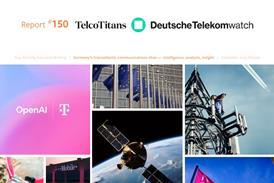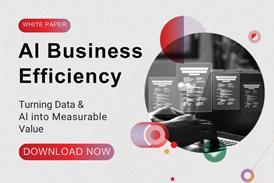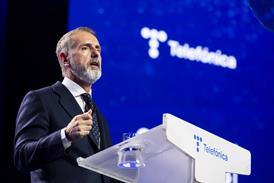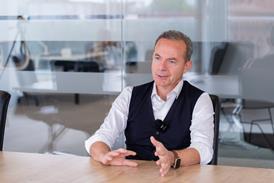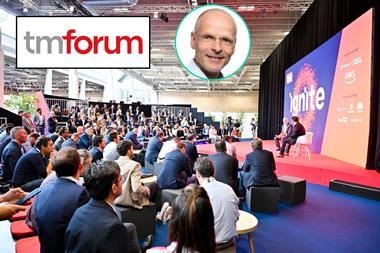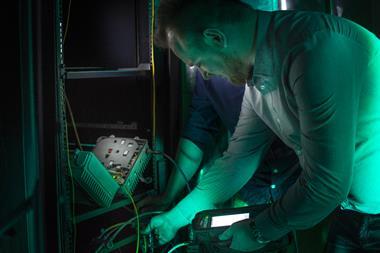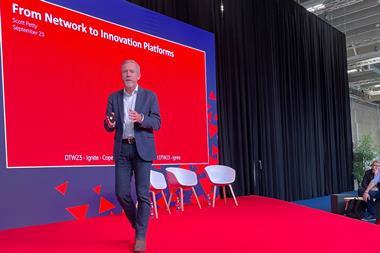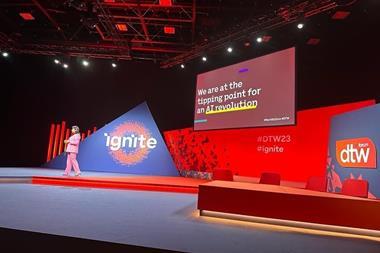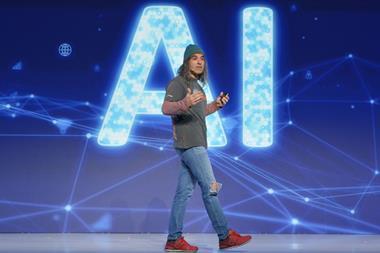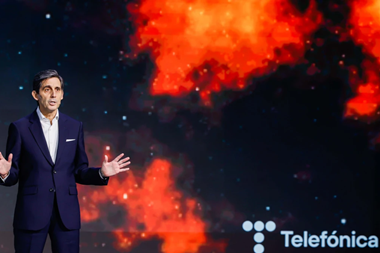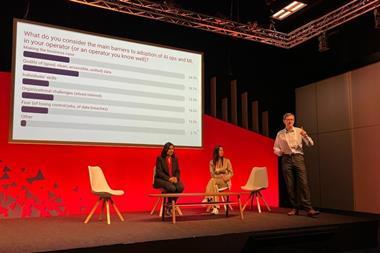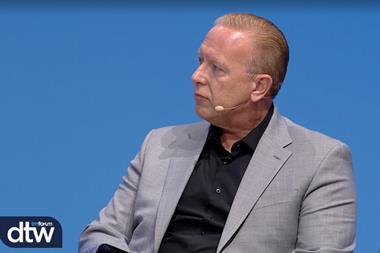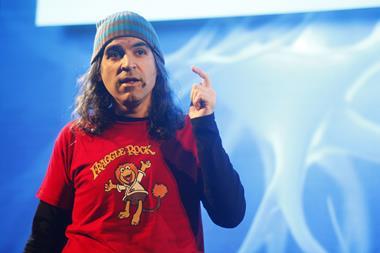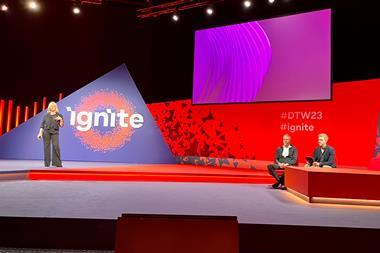Ahead of the telecoms industry’s digital transformation gathering in Copenhagen, TM Forum chair and visionary Steffen Roehn shares key perspectives on partnering hyperscalers (and leveraging B2B in Europe), Asia-the-innovator, un-learning the past, ‘greenfield in the mind’, software-or-extinction, the Forum’s own reset and new CEO Playbook and much more, cracking the growth and skills nuts, and his own positivity of outlook.

In this article
1. Roehn: physicist and problem solver by nature; CIO, disruptor and industry guide by experience — incl. post-Jio impressions of Asian diversity and vibrancy2. Rejecting typecasting as ‘the greenfielder’ — incl. telcos become ‘greenfield’ thinkers
3. A bigger tent is better — embracing hyperscalers — incl. the need for softwarising telcos to embrace accountability
4. Telecoms’ new digital leaders need soft skills — people and technology — incl. the as-a-service ‘window of opportunity’ in Europe
5. TM Forum also developing beyond technology — supporting the C-Suite — incl. cracking the industry’s ‘toughest nut’: growth
6. Rethinking the Forum’s mandate — leading through collaboration (and fun) — incl. the importance of not discarding traditional knowhow and skills
7. About TM Forum — profile
8. AboutDTW23 – Ignite — Copenhagen, 19–21 September 2023
9. About TelcoTitans Eventwatch — event partner and amplification
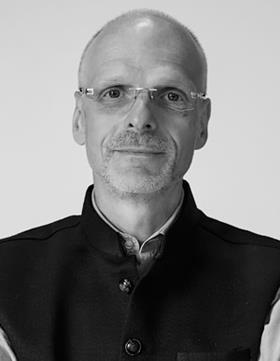
As a Partner at Bain & Company and Chair of the TM Forum Board of Trustees, as well as CxO-level technology and strategy advisor to leading communication service providers, Dr. Steffen Roehn spends his time puzzling over some of the most complex transformation and modernisation programmes being run by big telecoms, media, and technology businesses across Europe and Asia.
Fortunately, he is always up for a challenge. “What I really like is to crack the toughest nuts for my clients”, he tells TelcoTitans, “I’m not so much motivated by money — I like solving problems”.
This summer, Roehn was offered an extended opportunity to scratch this troubleshooting itch, having been re-elected to serve a third term overseeing the TM Forum and its mission to ’lead the industry in defining the building blocks for new operating models, impactful new partnerships, and advanced software platforms to unlock growth’.
While he says his day job at Bain provides a “great platform for my set of expertise and capabilities”, he welcomes the chance to spend another two years helping push forward the industry association’s range of cross-operator initiatives. The posting gives him the “pleasure of working on the industry’s problems in a very collaborative manner, which is very much my style”, says Roehn.
Since his re-appointment, he says, he has “come back in with lots of energy” — and with many CSPs still struggling to modernise how they go about doing business, he’ll need it.
Speaking ahead of the TM Forum’s annual DTW23 – Ignite show in Copenhagen this month, he notes that the telecoms industry remains “somehow tied into the old way of things”.
“ Many executives are talking about doing things very differently, like the hyperscalers… but all of them are struggling on how to do this. ”
Roehn.
Roehn: physicist and problem solver by nature; CIO, disruptor and industry guide by experience
A physicist “by nature”, Roehn brings a rich backstory to the job of chairing TM Forum. After completing a doctorate at the CERN particle physics research initiative in Geneva, he spent a decade working in consultancy for Gemini and Diebold, before going in-house at Deutsche Telekom where he rose to become Chief Information Officer in 2009.
Following a twelve-year spell at the German giant, he headed for fresh pastures and took on a role as CIO and Advisor at Reliance Jio Infocomm, helping magnate Mukesh Ambani set up his high-impact challenge to India’s mobile establishment. This five-year stint was, he says, “one of the most inspiring, toughest and rewarding chapters of my life”.
“ This was, for me personally, a learning exercise like nothing before it because you have suddenly to build a telecoms operator with the mindset of a hyperscaler. That drove such a different set of design criteria, a different set of technology choices, and a different way of how you run your teams and how you approach the market. ”
Roehn.
Roehn on… post-Jio impressions of Asian diversity and vibrancy
“ If you look at Asia, it is fascinating. And actually, we shouldn’t talk about Asia as ‘one region’. There are so many Asias, if you look at China, Indonesia, India, Australia, other places. So there are many Asias. But one common element is the appetite and willingness to try out things that are very unconventional. It’s very much driven by the younger population, a growing population that still wants more. They’re very digital-native. Asia is for the world what used to be the Nordics for Europe, and that drives different behaviour.
The conversations with our members in Asia are geared very much towards growth. ‘How can we best collaborate with the hyperscalers? How can we actually try to attract them into our market and do something together with them? How can we pilot and innovate with startups truly — not just lip service?’. So, for me, the place to watch out for innovation and growth — how growth can really work — is Asia. And that’s why we are very proud actually to have many Asian players on our board and as [TM Forum] members. We have an event in Asia, but we’re also thinking about doing more in the future with Asia. ”
Roehn rejects typecasting as ‘the greenfielder’
Roehn’s time in India came to an end in 2019, a few weeks before he became TM Forum chair — and he says the experience gave him a fresh perspective on the digitisation challenges facing many of the organisation’s 800+ members.
For one, he had to do some work on himself when he took the Jio assignment. Roehn says he “struggled in the beginning, when I was working in the Jio team”, which means he can relate to the personal challenges facing staff within more established operators, as new ways of working come into force.
“ Many skills you actually acquire in a big corporate telco are worth nothing when you move into the software and techco world. You have to unlearn a lot of this stuff and learn things new. ”
Roehn.
At the same time, Roehn dismisses the suggestion that Jio’s challenges were less complex than those faced by most other telcos, given its new-entrant status, and that his experiences are not directly transferrable.
The generalisation of a greenfield operator clean sheet advantage “is a myth”, he declares, noting how quickly complexities and bottlenecks can build up in even young startups.
“ I want to kill one of the myths many people who are stuck in legacy feel, which is ‘oh, greenfield is heaven’.
I’ve been in both worlds, and in greenfield you are missing that know-how. You have no organisational knowledge even for the basic simplest thing, so you have to reinvent the wheel all day long. It’s not easy. And the second thing is even in the fastest [startup venture] like Jio or Rakuten Mobile, it takes five or more years to bring such a service up. You create your own legacy. You have technology that is 10 or 15 years old already [when you go live].
This is why I shy away as a consultant from being asked to be the ‘greenfielder’. This discussion leads you to the wrong questions, and so to the wrong answers. ”
Roehn.
Roehn on… telcos becoming ‘greenfield’ thinkers
“ We have a phrase in the TM Forum, which I’m very happy to call out here: it’s ‘greenfield in your mind’. The problem sits between the ears. It’s not so much the technology or commercial aspects. It’s ‘are you able to do greenfield in your mind?’.
I think every situation has its challenges, and nothing is good or bad. But you have to acknowledge your starting situation, with an honest assessment where you are. And this includes not only where you suck, but also where you’re really good. And then ‘greenfield in your mind’ is you need to apply a disruptive thinking approach to the situation you’re in. What is the way out? You have to have a beacon that guides you, and you also have to think about what is the next step you are going to do. And by the way, here we have with the Forum, with Open Digital Architecture, a great starting point. I’m not saying it fixes every problem, but if you want to have 80% to start, take that, and do the other 20% you need on top of it. ”
A bigger tent is better — embracing hyperscalers
As DTW23 – Ignite approaches, Roehn is confident that there is now widespread understanding and acceptance of the need for a new direction in the industry, and that the event has a strong role to play in helping telcos deliver this change.
The TM Forum — once largely seen as a standards body — has performed something of a “turnaround” of its own since he became chair, widening out its focus and doubling its membership base.
One way that Roehn says the grouping has become more “open” is by bringing hyperscalers into the fold, seeing Amol Phadke, when Head of Global CSP Industry at Google Cloud (and now Telenor CTO), join its Board of Directors in October 2022. “We have acquired all the hyperscalers as members, so rather than treating them as ‘the enemies or the competitors’, we treat them as partners”, he says.
“ We firmly believe that by opening up and getting them on board, we have opened so many minds. They’re not here to teach the operators what to do. They are partners who have reached out their hands to the operators and are not only willing to help… they’re helping…
I would even say that the competitive dynamics between the hyperscalers themselves is more of a blocking factor for collaboration than [competition] between the hyperscalers and the telcos right now. So we have them together. ”
Roehn.
Roehn on… the need for softwarising telcos to embrace accountability
“ In the past, in the vertically integrated model, telcos worked with the equipment manufacturers and asked them, basically, ‘you build my network for me or with me, and you bring the innovation, you bring the software — but bring it all integrated so that I can just manage the stuff’. That world is over. Now you have to go into the boxes. You have to understand the software. You have to drive the software. Without software capabilities in a telco, I would say a telco won’t survive in the future. It’s impossible. And that involves not only hiring some software engineers but changing the whole operating model.
That’s one of the biggest changes I see. It’s a big change for the network team and also, maybe strangely, a big change for the IT team because they’re also used to working with lots of partners who take part of the accountability, and now they are in a position that they have to own the software stack to some extent by themselves, at least the architecture and the way how things tie together. ”
Telecoms’ new digital leaders need soft skills — people and technology
Another way TM Forum has evolved has been to become more focused on some of the ‘softer’, less technical aspects of telco modernisation, such as leadership, organisation, and skills.
Generally, Roehn says executives heading telco technology departments — whether in the network, IT, or digital realms — are fully cognisant of the need to transform how they go about running their operations. The majority have, for instance, now bought into the case for agile, incremental ways of performing projects and the need to shift focus away from the long-term, ‘big bang’ (and often ultimately flawed) programmes that old-style telco mentalities have been wedded to.
Change is not easy, however, and the event will be another chance for executives that are working to adapt their organisations to share learnings and experiences from the front line.
“ I have at this time a much more positive perspective about our industry. Having worked the last five years [with] many different telcos around the world, I think the leaders of technology, whether in network or IT or digital, are 100%-convinced that they need to move [to transform]. It’s not lip service. They’ve seen it working. It’s about small increments, small projects, delivering MVPs, and then getting going. Don’t do these huge projects any more. I think that’s the current state of the telcos now.
But it’s also difficult for network and IT on both fronts because it’s so ‘anti’ what the whole organisation has been doing in the past. It’s not so much about the leaders understanding what needs to be done, but the organisation lacking the capabilities to do it…
Here, bringing in the right people who know how to effectively implement these new ways of doing things, and not trying to boil the ocean, is key. You need to really show the whole organisation that this brings benefit. And I’ve seen many good examples in the last couple of years, so I’m actually a bit more optimistic for our industry on this. ”
Roehn.
Roehn on… the as-a-service ‘window of opportunity’ in Europe
“ So the European market, owing to regulations that were seen 10, 15, or 20 years back as super-progressive, forcing a lot of competition, has its benefits in terms of low prices. But this actually means that investments for the telcos are hard. You see this now, with national governments trying to fund fibre more because they feel somehow we have overdone it. You can sense that some governments are ready to put in some money so that their citizens get proper access to connectivity. And because of the fragmentation of the market and this [tension] between EU regulation and national interests, it’s not an easy spot to be in. That’s why all the big European players have their own challenges.
But we see windows of opportunity for Europe. One is in the whole area of B2B. Every CIO these days says ‘I’m going all in cloud’… which means every CIO now has to buy compute and storage from a hyperscaler. All of a sudden, they turn to their connectivity provider and are confronted with the old way of doing business — and not the easily configured connectivity services they’re used to from the cloud providers. So I think that window of opportunity is there if the telcos move fast into this connectivity-as-a-service area, taking the hyperscalers as a beacon, and combining this with their know-how on how to do infrastructure. We are working with our members on that specific challenge, big time. ”
TM Forum also developing beyond technology — supporting the C-Suite
A further aspect of TM Forum’s evolution that will be evident at DTW23 – Ignite is the organisation’s effort to extend focus beyond its tech core, and to commercial leaders and top-level executives. This year’s show will, therefore, feature TM Forum’s “biggest line-up of speakers”, with formats focused not just on technology activities but also their commercial impact, says Roehn.
DTW23 – Ignite arrives shortly after the TM Forum’s launch of the first edition of the CEO Playbook: Reigniting telecoms growth, a new resource designed to drive practical action to unlock growth for the industry. This is said to reflect operators’ need for a “holistic strategy” when it comes to digital transformation, where leaders of these businesses should “face, own, and address” the associated challenges.
“ We laid out a strategy a couple years back to extend the classical, more technical auditorium to the CEOs and commercial [leaders]. As CEOs these days know, they can’t transform their company without decent technology knowledge. I’m quite happy [with this baseline]; we are not there yet, but the momentum is great. ”
Roehn.
The Playbook is designed to provide a framework for realignment of telcos’ traditionally vertically integrated business model, outlining five “strategic positioning” options they can adopt instead. This quintet of future guises — all of which have already been adopted by some CSPs — encompasses:
- NetCo.
- Platform-ready Connectivity Provider.
- Innovation Platform Provider.
- Solution Provider.
- Purveyor of Solution Marketplaces.
Roehn describes the Playbook as articulating the new ways that CSPs have begun “looking at the industry” over recent years.
“ The vertically integrated model that you have in a classical telco is, unfortunately, not obviously successful. If you look at the [European] market, with trillions of euros of investments over five years and almost no return, something is wrong. ”
Roehn.
He also sees this re-layering exercise as right within the TM Forum’s ballpark, such as via use of the grouping’s flagship Open Digital Architecture blueprint to help CSPs develop platform-based business opportunities.
“ This whole move out of the legacy mess of vertical stacks is part of our core business at TM Forum, and we’ve been quite effective at showing the best practices of those companies who have been able to do it. So DTW23 – Ignite will provide practical help, by bringing those examples — as well as talking about the practical problems that you need to tackle.
For example, legacy migration with customer data covering millions of users is not a simple thing. And if you don’t tackle that properly, you’re stuck. You can have the greatest new architecture, the greatest new software skills, but if you can’t migrate out of legacy, you have a problem. ”
Roehn.
Roehn on… cracking the industry’s ‘toughest nut’: growth
“ How can we come back to growth as an industry, as individual players? That’s the biggest nut. The good thing is we have a few examples of members who have done it, so it’s possible — we can prove that — but we don’t do it enough as an industry. So that’s the biggest single challenge, and that’s why we have put this at the core of our strategy of the Forum. How can we help ignite the growth?
This goes very much back to the very old days in mobile, but I still use the example because I still hold it to be true. We had two approaches when mobile data came in. One approach was ‘oh boy, mobile data, that is really expensive, we have to invest in all this stuff so let’s try to minimise the usage to be really efficient, and try to make sure we have the least cost possible for mobile data’. The other approach was, ‘let’s make the service as cheap as possible and make it so easy for consumers to consume that this grows like anything because then it forces us to be the leader in efficient mobile data provisioning’. Super different strategies: the first one is the old telco logic, which I think is wrong if you want to have growth; and the second one is the right one. You have to think of ‘how can I make services so efficient and so cheap that the growth of the service itself will over-compensate for the assumed loss of revenue from elsewhere’. That’s the ‘greenfield in your mind’. ”
Rethinking the Forum’s mandate — leading through collaboration (and fun)
Roehn and his team’s work to update and expand TM Forum is not set to end at DTW23 – Ignite either. He still has nearly two years on his current tenure and in June, took the organisation’s board to Mumbai — near Jio’s headquarters — to “rethink again” about the TM Forum proposition.
TM Forum’s leadership “has to think about what’s next and what we can do with it more”, Roehn says.
That said, its respected and collaborative Open Digital Architecture blueprint will “never be thrown away because we feel that’s one of our core workhorses and very successful”, he adds.
“ I’m not naming any other association on this planet because we are humble and modest, but at TM Forum we live day in, day out to improve the way our members collaborate. We are paranoid about providing the best collaboration platform. We are not there yet, but we want to become it. The whole leadership team, and more and more the members themselves, are putting in their own personal energy to drive topics and be role models for collaboration. ”
Roehn.
And ultimately, Roehn is revelling in solving that conundrum.
“ My job is fun, I have to say. It’s just fun. ”
Roehn.
Roehn on… the importance of not discarding traditional knowhow and skills
“ What’s the next step? Very often, it has to do with people. Here, I’ve seen the most effective leadership teams actually combining a bit of both: the existing knowledge and new knowledge. If you completely set teams aside with new knowledge — honestly speaking, in my experience — I have not seen a single example where this has worked.”
About TM Forum
TM Forum is one of the collaborative bodies most frequently namechecked within the digital service provider and vendor ecosystem, having metamorphosed from 1980s’ roots supporting network management to becoming integral to the industry’s network–IT convergence, digital transformation, standardisation, architecture, interoperability, best practices, modernisation, innovation, and reinvention. It has become synonymous with initiatives such as its cross-domain Catalyst project, Open Digital Architecture, and Open API best practices and standards. The organisation boasts a growing 850+ membership and reach into more than 90% of the industry measured by revenue.TM Forum positions itself as a global alliance of telco and tech companies, leading the industry in defining the building blocks for new operating models, impactful new partnerships, and advanced software platforms – within the context of helping unlock the value of data to create nearly endless opportunities for players across the communications ecosystem
About DTW23 – Ignite (Copenhagen, 19–21 September 2023)
TM Forum’s DTW23 – Ignite, being hosted at the Bella Centre in Copenhagen on 19–21 September, is a premier international event for digital service providers. It looks to upend traditional operational and business models, and usher in new opportunities for growth enabled by AI, autonomous networks, and open digital architectures.DTW23 – Ignite brings together thousands of TM Forum’s operator and enabler members with other stakeholders and communication service providers. Agenda highlights include keynotes from industry leaders, unveiling of Catalyst and Moonshot Catalyst joint R&D innovation projects, dedicated breakout sessions, exhibits, live demos, and awards. The 2023 billing features a record number of CEOs, along with dozens of other CxOs, as TM Forum continues to extend its reach and impact beyond technologists. TM Forum invites you to join its journey at DTW23 – Ignite this September in Copenhagen — https://dtw.tmforum.org/passes/.


